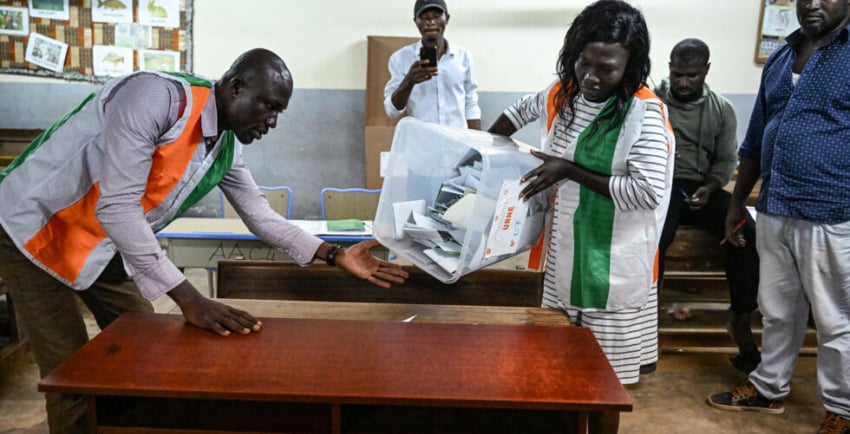2025 Ivorian Presidential Elections: Between a Resurgence of Crisis and an Opportunity for Change
By Ahmed Gamal AlSayad, Political Science Researcher
7/6/20254 min read


The shadow of civil war hangs over Côte d'Ivoire as it approaches its presidential election in October 2025. This is not just another vote; it is a critical test for a nation whose recent history has been defined by violent, election-fueled conflict. The political landscape is a tinderbox of unresolved tensions: the ruling party’s ambiguous plans, the systematic exclusion of powerful opposition figures, and the growing threat of terrorism spilling over its borders.
The upcoming Ivorian election is a decisive moment. It could steer Côte d'Ivoire toward a future of peaceful democracy or drag it back into the turmoil that has cost thousands of lives and fractured the nation. The stakes could not be higher.
Why This Election Carries the Weight of History
Presidential elections are meant to be pillars of stability, but in Côte d'Ivoire, they have often been catalysts for chaos. This history is not abstract; it is a painful, living memory for its citizens.
The 2010 presidential election plunged the country into its second civil war after incumbent President Laurent Gbagbo refused to concede defeat to Alassane Ouattara. The ensuing conflict claimed approximately 3,000 lives and left deep scars on the nation.
This followed the 2000 election, which also triggered a violent conflict and led to the First Ivorian Civil War (2002–2007).
This dangerous pattern—where the democratic process itself becomes a flashpoint for violence—frames the deep-seated anxiety surrounding the 2025 vote.
The Political Tinderbox: Three Crises Converge
Today, the political atmosphere is charged with uncertainty and distrust, driven by three key factors.
1. The Fourth-Term Question and Constitutional Controversy
The central drama revolves around incumbent President Alassane Ouattara. The Ivorian constitution limits a president to two terms, but Ouattara and his ruling party (RHDP) argue that the 2016 constitutional reform reset the clock, allowing him to run in 2020 and potentially again in 2025. This legal maneuvering, which the opposition deems a blatant power grab, was the source of major unrest in 2020.
With Ouattara hinting he is "excited to continue serving," his potential candidacy threatens to reignite that crisis. If he does not run, the party may nominate another figure, but the ambiguity itself is fueling instability.
2. A Disqualified Opposition
The political field has been deliberately narrowed. The electoral commission has disqualified several prominent opposition leaders, a move their supporters decry as a political purge.
Tidjane Thiam, a former Credit Suisse CEO and leader of the main opposition party (PDCI), was seen as the strongest potential challenger but was disqualified over his past dual citizenship.
Former President Laurent Gbagbo and his ally Charles Blé Goudé are barred due to past convictions related to the 2010 crisis.
Former Prime Minister Guillaume Soro is ineligible due to an in-absentia conviction.
This has left the opposition crippled and enraged. In response, they have formed the Coalition for Peaceful Alternation (CAP-CI), accusing the judiciary of being used as a political weapon. This deep erosion of trust in the electoral process is highly dangerous in a country with a history of rejecting results it deems unfair.
3. The Threat from Beyond the Borders
Côte d'Ivoire is located in a deeply volatile region. The Sahel has become a global epicenter for terrorism, with groups like JNIM highly active in neighboring Mali and Burkina Faso. This instability is no longer a distant problem; it has already spilled over into coastal West Africa. The presence of these groups poses a grave threat to the election, with the potential to disrupt voting, intimidate citizens, and destabilize border regions.
Four Paths to 2025: Scenarios for a Nation at a Crossroads
Given the current climate, Côte d'Ivoire's future could unfold along one of four potential paths:
Path 1: Ouattara’s Controversial Fourth Term
The ruling party nominates President Ouattara, relying on its controversial interpretation of the constitution. This high-risk strategy would likely trigger a massive backlash from an excluded and unified opposition, potentially leading to widespread unrest and violent conflict.
Path 2: The Ruling Party Pivots to a New Candidate
To de-escalate tensions, the RHDP chooses an alternative candidate, such as a prominent governor or the president of the National Assembly. This would sidestep the constitutional firestorm and could be seen as a conciliatory gesture, lowering the risk of a major crisis.
Path 3: A Unified Opposition Challenges the Status Quo
With its top leaders disqualified, the CAP-CI coalition unites behind a single consensus candidate. A unified front would create a formidable voting bloc and pose the most significant electoral challenge to the ruling party, transforming the political landscape.
Path 4: A Last-Minute Dialogue and Compromise
Under domestic and international pressure, political leaders engage in dialogue to reform the electoral process and review the disqualifications. While this currently seems unlikely given the tight timeline and entrenched positions, it remains the most hopeful path to avoiding a crisis.
Conclusion: A Fateful Choice
Côte d'Ivoire stands at a fateful crossroads. It faces a stark choice: organize fair, inclusive elections that restore confidence in its democracy, or risk falling back into a spiral of violence fueled by political exclusion and disputes over legitimacy. The outcome will depend on whether the nation’s leaders can prioritize the national interest over partisan gain. Dialogue and consensus are not signs of weakness; they are the only viable path to navigating this critical moment and securing a peaceful future for one of West Africa’s most important nations.
Download full study here.
Empowerment
Amplifying African voices for sustainable progress together.
Contact US
Growth
Street No. 3281, N'Djamena, Republic of Chad.
© 2024. All rights reserved.